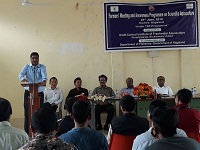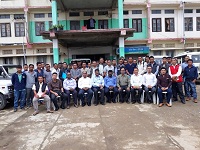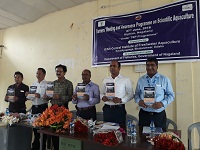27th June 2018, Kiphire, Nagaland
ICAR-Central Institute of Freshwater Aquaculture, Bhubaneswar, Odisha under its Tribal Sub-Plan Programme and in collaboration with State Fisheries Department, Nagaland conducted the Tribal Farmers’ Meet and Awareness Programme on Scientific Aquaculture at Kiphire, Nagaland today. Kiphire is the Tribal Aspirational District of Nagaland State declared by Government of India.
Dr. S.S. Mishra, Director, ICAR-CIFA, Bhubaneswar in his presidential address highlighted the role of fish culture for livelihood development and nutritional security of tribal population of the country, and being the cheap animal protein source, fish should be included in the food menu of all.



Shri Mohammed Ali Shihab, IAS, Deputy Commissioner, Kiphire in his inaugural address applauded the role of CIFA for selecting such a remote place like Kiphire, Nagaland for conducting the meet and giving the message for adoption of scientific fish culture in the district. He said that all departments to come together for fisheries development in the district.
Dr. B.C. Mohapatra, Principal Scientist and Chairman, TSP, ICAR-CIFA, Bhubaneswar highlighted the role of the institute in demonstrating freshwater aquaculture technologies to the selected tribal population of the country and use of portable fish hatchery developed by ICAR-CIFA for production of quality seed for stocking in aquaculture ponds.
A publication on “Freshwater Aquaculture in Nagaland” in English language was released during the meet.
Fifteen progressive farmers from Kiphire were felicitated and a Farmers-cum-Scientists interaction meet was organized on the occasion.
Total 120 farmers and Government officials including Scientists from ICAR-CIFA, KVK and line departments attended it.
(Source: ICAR-Central Institute of Freshwater Aquaculture)








Like on Facebook
Subscribe on Youtube
Follow on X X
Like on instagram